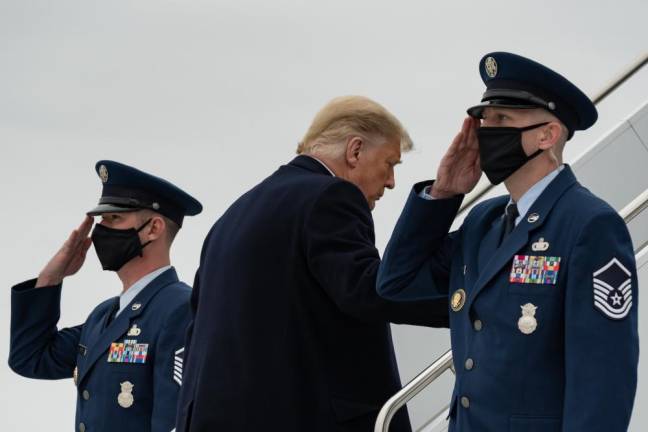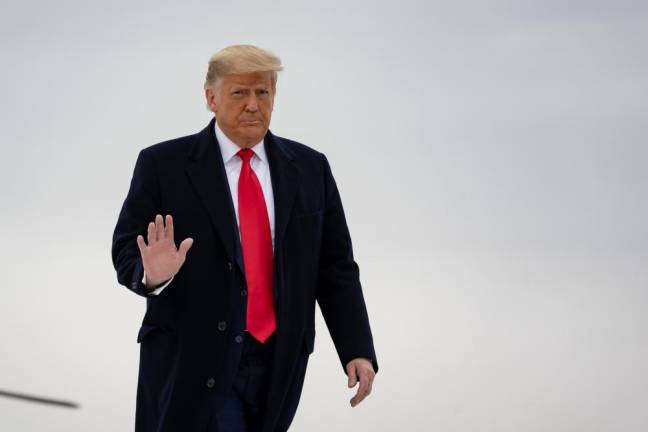The Queens Daily Eagle won well-merited attention last week for its headline: “Queens man impeached - again.” But really, this seems so provincial compared with the more thorough: “Queens man impeached by West Sider, again. Newly promoted Brooklyn Guy plans trial.” Yes, all politics is local (and most journalism, too).
For a presidency that seemed so wildly at odds with the values of the majority of New Yorkers, it is remarkable how many of the key figures in the chronicles of the Trump years came from or through New York City. A former mayor became his chief defender. One of his attorneys general went to Horace Mann. Trump, himself was born and raised here, even if by wolves.
“He is totally a New York figure,” said the dean of New York political observers, George Arzt, who covered Trump as a New York Post reporter and encountered him often as a media and political consultant. “He’s totally shaped by the desire, first, to get into Manhattan from Queens - he had this condescending attitude toward the outer boroughs even though he was a product of one - and then Roy Cohn shaped him and he became a massive liar.”
Donald Trump leaves the presidency much as he left earlier jobs, in a crossfire of recriminations, claims and counterclaims and an ugly feeling of being had. The inauguration of his successor, Joe Biden of Delaware, will take place without Trump’s presence, but in the presence of more military security than for any inauguration since the Civil War.
But while much is uncertain, Trump’s departure does mark the completion of his separation from New York. He arrived in Washington as a resident and voter from New York. But flying out, his plane turns south to Mar-a-Lago, on Florida’s Atlantic coast, where his taxes will be lower and the Republican governor might even resist an extradition order.
There is a temptation for New Yorkers to proclaim, wistfully, “Donald, we hardly knew you.” But that would be a lie worthy of Trump, or even his mentor, Roy Cohn, the right wing lawyer who specialized in destroying his opponents by the smear when the ballot box was not enough. Trump was both a product of, and the antithesis to, New York’s combative, polyglot, diverse, sharp elbowed and sharply worded culture.
“It’s the Same Guy”
The stories of Trump in New York, nostalgically retold in these final days of his presidency, echo later tales of Trump as President. Surely the Trump who demanded the execution of five young black men for a Central Park rape they didn’t commit presaged the Trump who won office denouncing Mexican immigrant rapists who didn’t exist.
The Trump who tried to bully Richard Ravitch at the Urban Development Corporation into giving him a tax break for The Grand Hyatt hotel on 42nd St. sounds precisely like the Trump who four decades later tried to bully the secretary of state of Georgia into finding him 11,780 votes to flip the election.
Trump was refused both times.
“It’s the same guy,” Arzt said of the Trump he and the rest of us knew in New York and the man in the White House. “We all knew it. That’s what frustrated us. When he got elected we all knew what he was.”
Which raises the irony Ravitch points out: “It was impossible for city residents not to know the name Trump.” He put his name on everything. Arzt recalls once chasing him down to join a group of developers lead by Robert Tisch in repairing high school baseball diamonds. As Arzt left Trump’s office, check in hand, Trump yelled after him: “George, George, don’t forget my name goes on big on the field.”
“So what’s interesting,” Ravitch notes, “is even though his name was better known here than any where else he didn’t carry New York.” As Trump leaves office, the latest polling suggests most of the nation has now adopted the low opinion New Yorkers have long had of Trump, according to the latest survey by the Pew Research Center, which put his approval rating at 29%.
Touch of Atonement
Perhaps knowing him so well contributed to a dismissiveness among New York media and political elites, who were more stunned than anyone when he won, first, the Republican nomination and then the presidency in 2016. Is there just a touch of atonement among the many New Yorkers who, having watched the city forge him on his way up, are now jockeying for a role in finishing him off?
Mayor Bill de Blasio announced last week that that the city would revoke The Trump Organization’s deal to run two Central Park ice skating rinks and a golf course built on landfill in the Bronx. Eric Trump quickly replied that this was cancel culture brought to city contracting, an idea that would surely set George Washington Plunkett spinning in his literary grave.
The mayor’s actions were small beer compared to what may be coming from Cyrus Vance, the Manhattan District Attorney, and Letitia James, The state’s Attorney General, both of whom are pursuing potential criminal charges of tax and other fraud against The Trump Organization and Trump himself.
This New York participation in trying to assure Trump’s farewell is final was dramatized on C-SPAN last week when the cameras spotted a bulging Zabar’s shopping bag jostling across the floor of the House of Representatives under the careful stewardship of the chair of the Judiciary Committee, Jerry Nadler of New York’s tenth district, which runs down Manhattan’s West Side and then leaps across the mouth of the East River to Brooklyn.
The bag, unmistakable with its orange lettering, contained, according to Nadler’s staff, a babka and a copy of The Constitution, a document much needed at that moment as the House moved to impeach Trump for the second time for offenses laid out in the 14th Amendment.
As West Siders appreciate, a babka is valuable at any time. For those reading this in exotic locales like, say, Washington, D.C., where blueberry bagels are a thing, a babka is a sweetened bread whose recipe was carried all over the world from Eastern Europe in the Jewish diaspora early in the last century.
For cultural equivalency, a WASP executive visiting the West Side of Manhattan from the West Side of Los Angeles once dug heartily into a Zabar’s babka and proclaimed, “great coffee cake.”
Cultural reconciliation can take many forms.
Journalists like to put even the most outsized event into some historical context or other. Lisa Lerer in the New York Times on Sunday reviewed the after-office lives of previous “Pariah Presidents,” as she put it. She settled on Richard Nixon as the closest match.
But one detail escaped her. In his comeback years, Nixon moved to New York City.
Donald Trump leaves the presidency much as he left earlier jobs, in a crossfire of recriminations, claims and counterclaims and an ugly feeling of being had.

